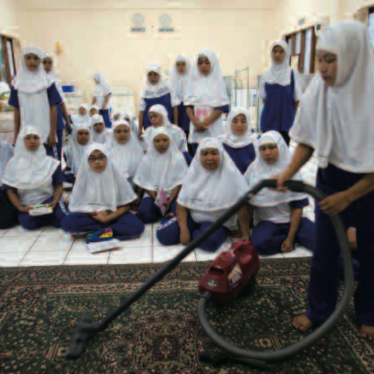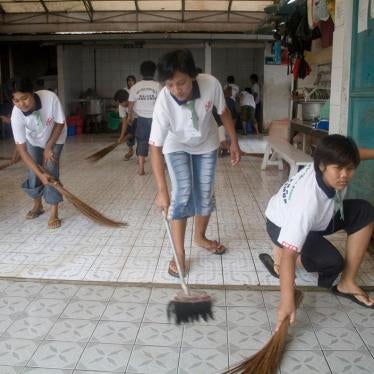Governments in the Middle East should act quickly in 2009 to fulfill longstanding promises to protect migrant women’s rights, said Human Rights Watch today, ahead of December 18, 2008, International Migrants’ Day. A number of governments have promised major reforms in the response to widespread and egregious abuse, but have yet to finalize and carry out these plans.
Countries that are drafting and debating labor reforms that will extend greater protections to domestic workers include Jordan, Lebanon, Saudi Arabia, Kuwait, the United Arab Emirates, Bahrain, and Qatar.
“Each day of delay leaves migrant domestic workers open to abuses such as unpaid wages, being locked in their workplaces, and to physical and sexual abuse,” said Nisha Varia, deputy director of the women’s rights division at Human Rights Watch. “It is encouraging that governments are finally considering serious reforms, but these proposals mean nothing until the new protections are in place and being enforced.”
Millions of domestic workers, primarily from Indonesia, Sri Lanka, the Philippines, and Ethiopia, are employed in the Middle East. Previous Human Rights Watch research has documented how the exclusion of domestic work from labor laws and restrictive immigration sponsorship policies give employers tremendous power to exploit migrant women without fear of penalty (https://www.hrw.org/en/category/topic/migrant-workers/women-girls ).
Abuses against domestic workers include 18-hour workdays with no days off, physical confinement in the workplace, denial of food, lack of payment for months or years, physical and sexual abuse, and in some cases, forced labor and trafficking. Migrant domestic workers face multiple barriers to redress from the justice systems in host countries, and abusers are rarely punished.
Jordan, host to an estimated 70,000 migrant domestic workers, adopted amendments in July 2008 to include domestic workers in its labor law. Before this can go into effect, though, the government must create an accompanying regulation outlining the specific labor protections that will apply. Reports of mistreatment in Jordan are so rife that in January 2008, the Philippines barred its citizens from seeking employment there as domestic workers.
“Jordan’s decision to amend its labor code to protect domestic workers is a pioneering step that should be emulated by other countries in the region and the world,” said Varia. “But the true test will be whether the regulations provide comprehensive protection and whether they are enforced effectively.”
Saudi Arabia employs at least 1.5 million migrant domestic workers. In July 2008, its labor minister, Dr. Ghazi al-Gosaibi, reiterated the government’s intention to reform the country’s immigration sponsorship (kafala) system to link workers’ employment visas to three or four large recruitment companies instead of to individual employers. This proposal, while an improvement over the current system, still leaves migrants exposed to potential corruption and exploitation by recruitment agents. Saudi Arabia also drafted an annex to its labor code in 2005 to cover domestic workers, but has failed to issue it.
“In Saudi Arabia, some migrant domestic workers are forced to work for years against their will because of the kafala system requirement that they obtain their employer’s permission to leave the country,” said Varia. “The government recognizes the need for reform, but has consistently failed to act.”
Lebanon has stalled in considering labor or immigration reforms. It is host to approximately 200,000 domestic workers, and Human Rights Watch recently found that, on average, more than one domestic worker dies each week from suicide or botched escape attempts (https://www.hrw.org/en/news/2008/08/24/lebanon-migrant-domestic-workers-dying-every-week ).
Lebanon created a committee in February 2006 to improve protections for domestic workers, charging it with drafting a model employment contract and an amendment to the labor law. Neither task has been completed.
“Lebanon lags far behind almost every country in the region when it comes to protecting migrant women’s rights,” said Varia. “While other countries are debating concrete legal reforms, Lebanon has not even managed the incremental step of creating a fair employment contract.”
Human Rights Watch urged all governments to ratify the UN Migrant Workers Convention, which guarantees migrants’ human rights and promises state protection against abuse by employers, agents and public officials. Human Rights Watch also said that countries of origin must do more to create employment options so that women are not forced to migrate, and to monitor the recruitment process rigorously to ensure that migrants are not cheated or trafficked into forced labor.








